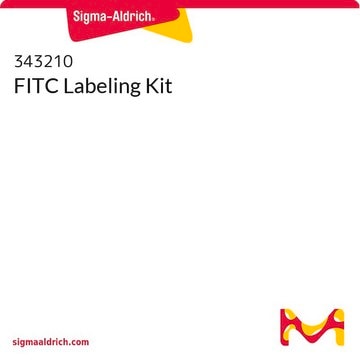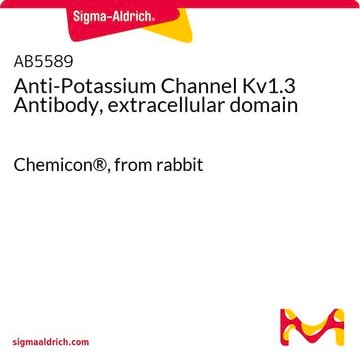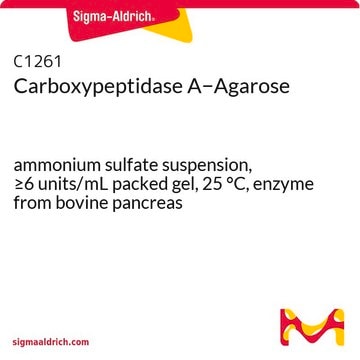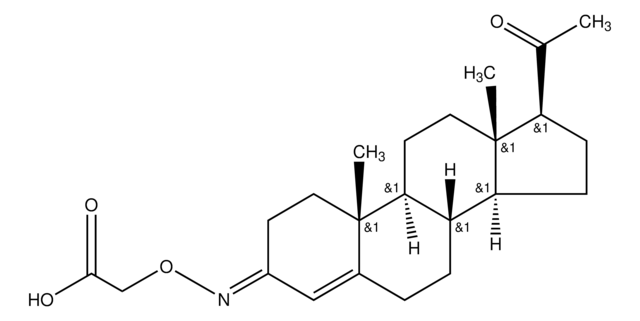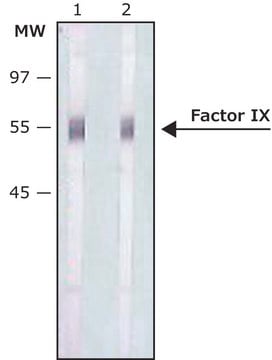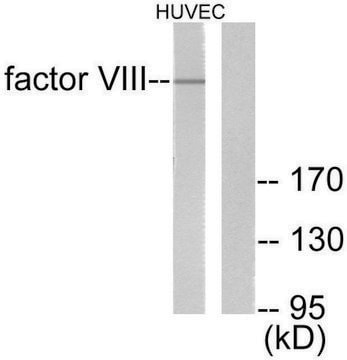FITC1
FluoroTag™ FITC Conjugation Kit
Synonym(s):
FITC
Sign Into View Organizational & Contract Pricing
All Photos(2)
About This Item
UNSPSC Code:
12352200
NACRES:
NA.32
Recommended Products
packaging
pkg of (Kit contains reagents for 5 conjugations.)
fluorescence
λex 495 nm; λem 525 nm
storage temp.
2-8°C
Application
The Flourotag FITC Conjugation Kit can be used for Immunohistochemisty and Immunocytochemistry using Flow Cytometry. It is also be used for the conjugation of FITC to peptide hormones, cytokines, growth factors and proteins.
Features and Benefits
- Suitable for both small (1 mg) and large (5 mg) scale conjugations
- Completely aqueous procedure - no DMF needed
- Fast gel filtration separation of conjugate from excess FITC
- Complete protocols for conjugation and F/P ratio determination
- Sufficient reagents for at least 5 conjugations of 5 mg protein each and for optimization of F/P ratio before scale-up
- References for applications and protocols
Principle
Sigma offers a convenient kit for preparing FITC-labeled antibodies. Fluorescein isothiocyanate (FITC), Isomer 1, is a widely used fluorophore, popular because of its high quantum efficiency and stability when conjugated. FITC is yellow-orange in color with an absorption maximum at 495 nm. Upon excitation it emits a yellow-green color with an emission maximum at 525 nm. Conjugation occurs through free amino groups of proteins or peptides, forming a stable thiourea bond (see reaction). FITC conjugates of antibodies, lectins, hormones, and growth factors have been used in a variety of immunohistochemical and flow cytometry applications. The protocols have been optimized for antibodies, but may be adapted to other proteins by the end user.
Analysis Note
Procedure
1. Dissolve protein and FITC in carbonate-bicarbonate buffer.
2. Slowly add FITC to protein with stirring. Cover with foil and stir 2 hours at room temperature.
3. Separate conjugate from free FITC on G-25 column. Collect fractions.
4. Pool fractions containing conjugate.
5. Determine F/P ratio of conjugate spectrophotometrically.
6. Stabilize with 1% bovine serum albumin and 0.1% sodium azide and store at 0-5 °C.
1. Dissolve protein and FITC in carbonate-bicarbonate buffer.
2. Slowly add FITC to protein with stirring. Cover with foil and stir 2 hours at room temperature.
3. Separate conjugate from free FITC on G-25 column. Collect fractions.
4. Pool fractions containing conjugate.
5. Determine F/P ratio of conjugate spectrophotometrically.
6. Stabilize with 1% bovine serum albumin and 0.1% sodium azide and store at 0-5 °C.
Legal Information
FluoroTag is a trademark of Sigma-Aldrich Co. LLC
Kit Components Only
Product No.
Description
- Sephadex G-25 column, 3.5 mL 1
- Sephadex G-25 column, 9.1 mL 1
- Fluorescein isothiocyanate isomer I - F7250KC-2MG 2 mg
Kit Components Also Available Separately
Product No.
Description
SDS
- P3813Phosphate buffered saline, powder, pH 7.4, for preparing 1 L solutions 5 pkgSDS
related product
Product No.
Description
Pricing
Signal Word
Warning
Hazard Statements
Precautionary Statements
Hazard Classifications
Eye Irrit. 2
Storage Class Code
10 - Combustible liquids
Flash Point(F)
Not applicable
Flash Point(C)
Not applicable
Certificates of Analysis (COA)
Search for Certificates of Analysis (COA) by entering the products Lot/Batch Number. Lot and Batch Numbers can be found on a product’s label following the words ‘Lot’ or ‘Batch’.
Already Own This Product?
Find documentation for the products that you have recently purchased in the Document Library.
Customers Also Viewed
Extragenomic actions of progesterone in human sperm and progesterone metabolites in human platelets.
P F Blackmore
Steroids, 64(1-2), 149-156 (1999-05-14)
Progesterone rapidly increased intracellular free calcium ([Ca2+]i) in human sperm, removal of extracellular Ca2+ prevented the increase in [Ca2+]i. The Ca2+ influx was not blocked by the T-type Ca2+ channel blocker mibefradil. However T-type calcium channels do appear to be
R F Mullins et al.
Ophthalmology, 104(2), 288-294 (1997-02-01)
Drusen are extracellular deposits that accumulate between the basal lamina of the retinal pigment epithelium and the elastic lamina of Bruch membrane in aging human eyes. Although specific types of drusen are recognized as significant risk factors for the development
H Hidaka et al.
Journal of lipid research, 40(6), 1131-1139 (1999-06-05)
We previously reported the identity and purification of two HDL3-binding proteins in rat liver plasma membranes. As these proteins are candidate high density lipoprotein (HDL) receptors and probably multifunctional, including a role in HDL metabolism, we have considerable interest in
Erhao Zhang et al.
Journal of hematology & oncology, 11(1), 44-44 (2018-03-22)
Chimeric antigen receptors (CARs) presented on T cell surfaces enable redirection of T cell specificity, which has enormous promise in antitumor therapy. However, excessive activity and poor control over such engineered T cells cause significant safety challenges, such as cytokine
Yatin R Gokarn et al.
Protein science : a publication of the Protein Society, 18(1), 169-179 (2009-01-30)
Ions can significantly modulate the solution interactions of proteins. We aim to demonstrate that the salt-dependent reversible heptamerization of a fusion protein called peptibody A or PbA is governed by anion-specific interactions with key arginyl and lysyl residues on its
Our team of scientists has experience in all areas of research including Life Science, Material Science, Chemical Synthesis, Chromatography, Analytical and many others.
Contact Technical Service
